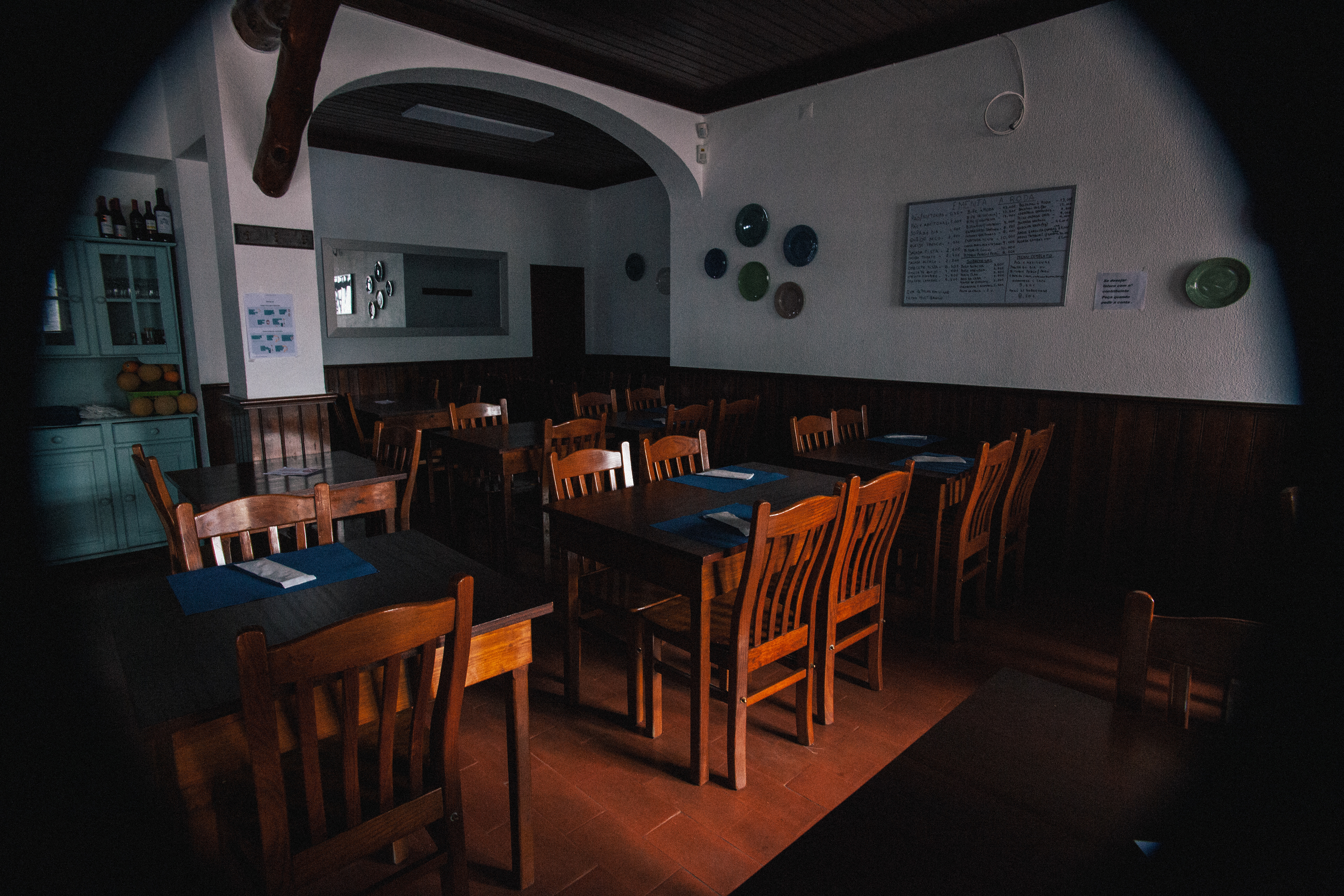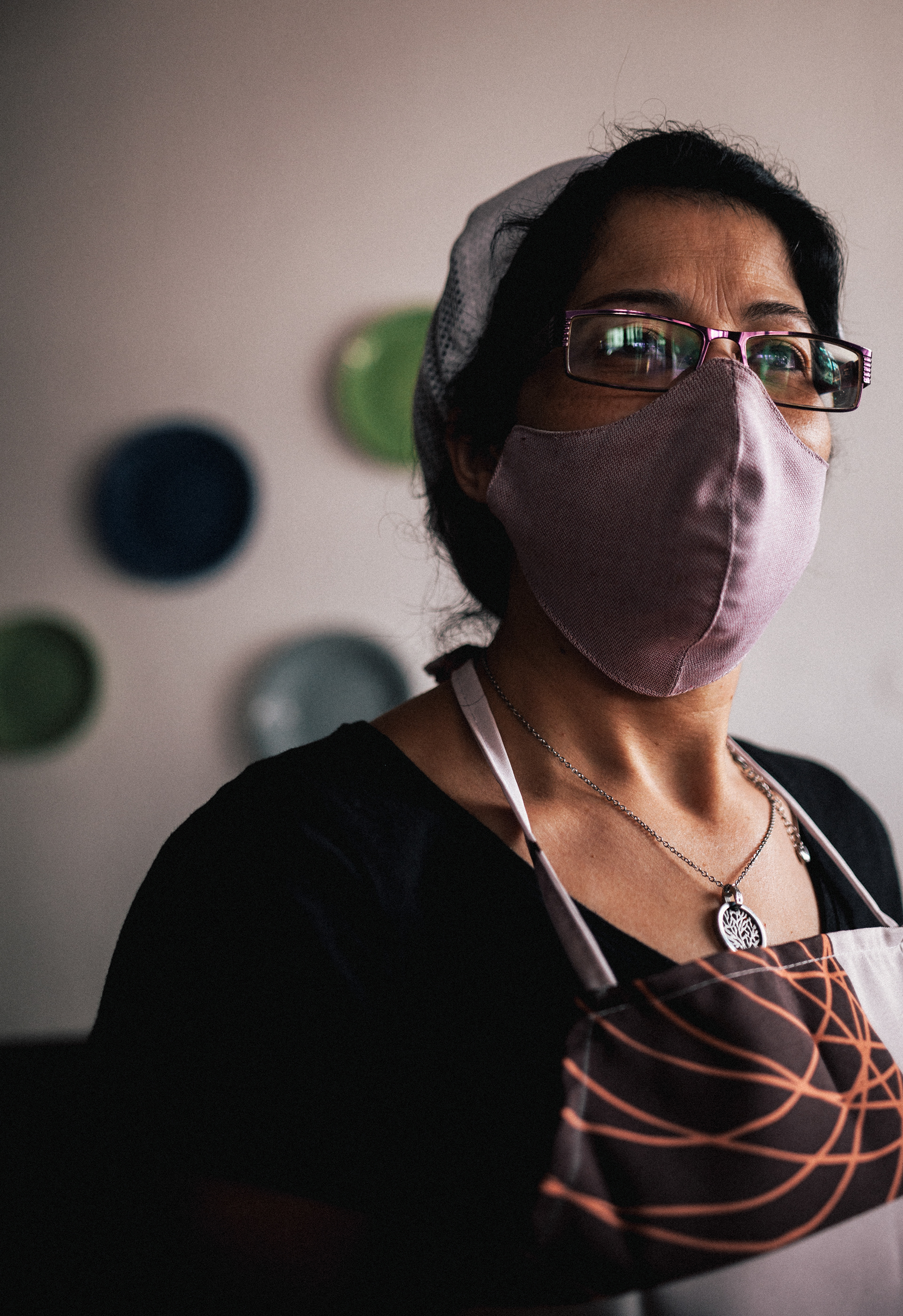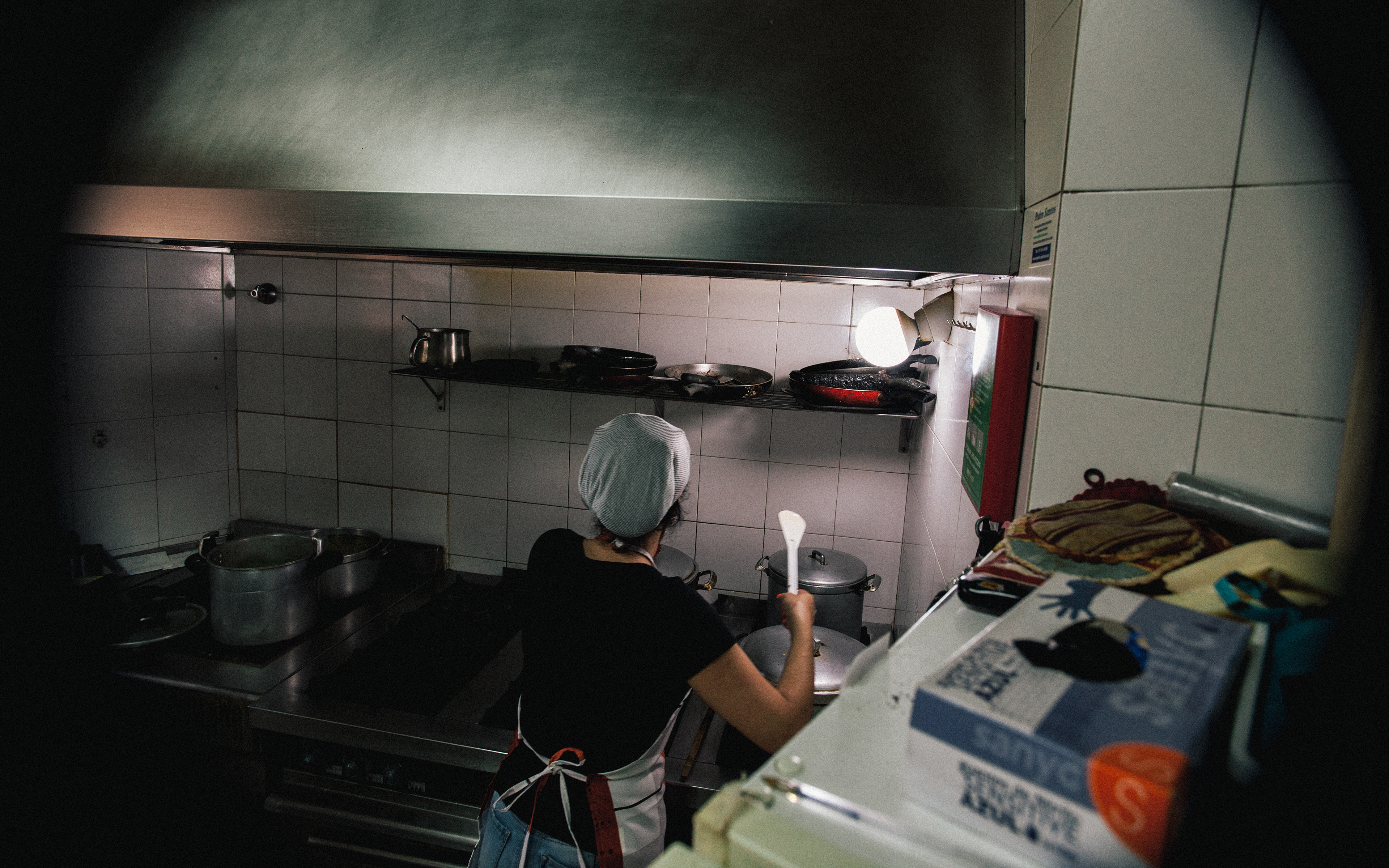THE NEW NORMAL I
living in coronavirus times
living in coronavirus times
Published on Passion Passport
The following article was written a few days after the Portuguese Government imposed new rules in the Greater Lisbon area, which came into force on the 23rd of June 2020.
The following article was written a few days after the Portuguese Government imposed new rules in the Greater Lisbon area, which came into force on the 23rd of June 2020.
English version (Portuguese version below)
The Coronavirus crisis has already radically changed the world as we knew it. The pandemic triggered a global health emergency with critical consequences for the economy and our way of life.
In Portugal, the situation has been nothing short of disconcerting. In a matter of weeks, our acclaimed response to the virus within Europe has crumbled down. Cases have been rising significantly again, particularly in the Greater Lisbon area, which has prompted the Government to implement new restrictions. For small business owners, who are trying to navigate changing rules and constraints, these are very uncertain times.
Living now temporarily back at my childhood home, in a neighborhood within Cascais, I wanted to find out more about how Coronavirus has been affecting us all. Devastating news have been infesting all extensions of the media, but to truly understand the repercussion of such facts, I decided I should speak to those in my local area.
This short photography series depicts the small businesses in my neighborhood. It's my attempt to capture this new reality, our "New Normal".
(The following words have been adapted from conversations translated into English from Portuguese, to keep the same meaning.)
The Coronavirus crisis has already radically changed the world as we knew it. The pandemic triggered a global health emergency with critical consequences for the economy and our way of life.
In Portugal, the situation has been nothing short of disconcerting. In a matter of weeks, our acclaimed response to the virus within Europe has crumbled down. Cases have been rising significantly again, particularly in the Greater Lisbon area, which has prompted the Government to implement new restrictions. For small business owners, who are trying to navigate changing rules and constraints, these are very uncertain times.
Living now temporarily back at my childhood home, in a neighborhood within Cascais, I wanted to find out more about how Coronavirus has been affecting us all. Devastating news have been infesting all extensions of the media, but to truly understand the repercussion of such facts, I decided I should speak to those in my local area.
This short photography series depicts the small businesses in my neighborhood. It's my attempt to capture this new reality, our "New Normal".
(The following words have been adapted from conversations translated into English from Portuguese, to keep the same meaning.)
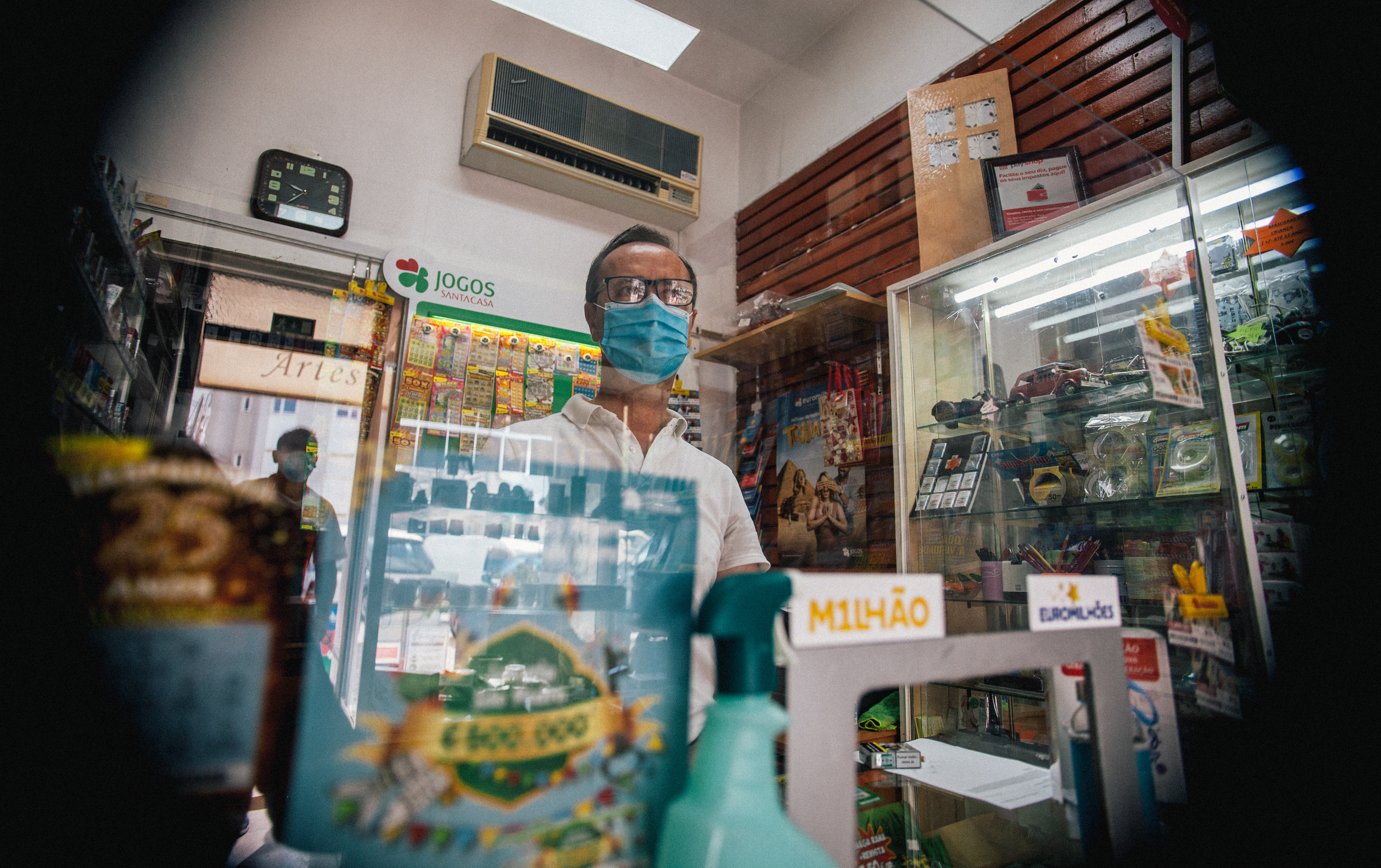
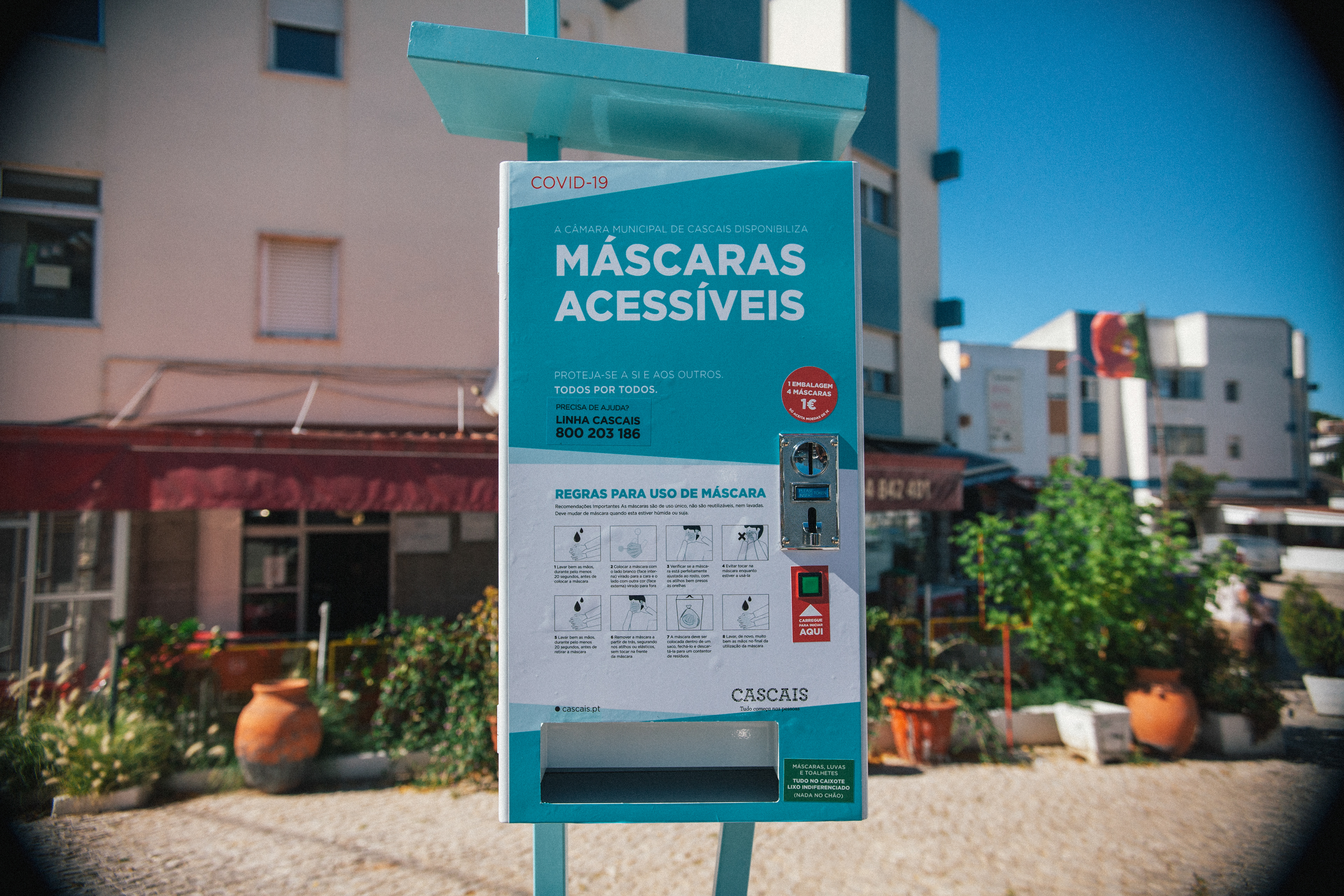
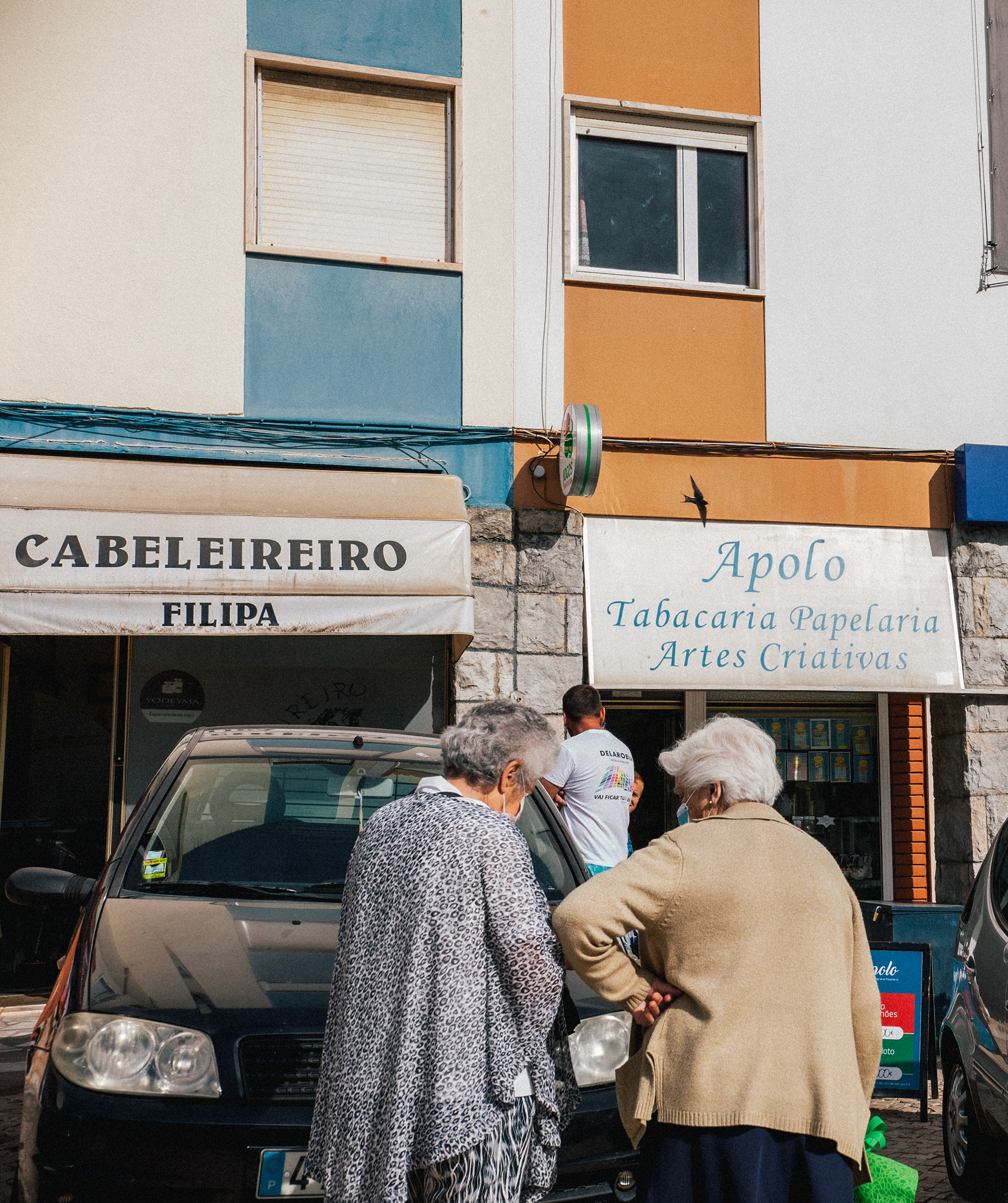
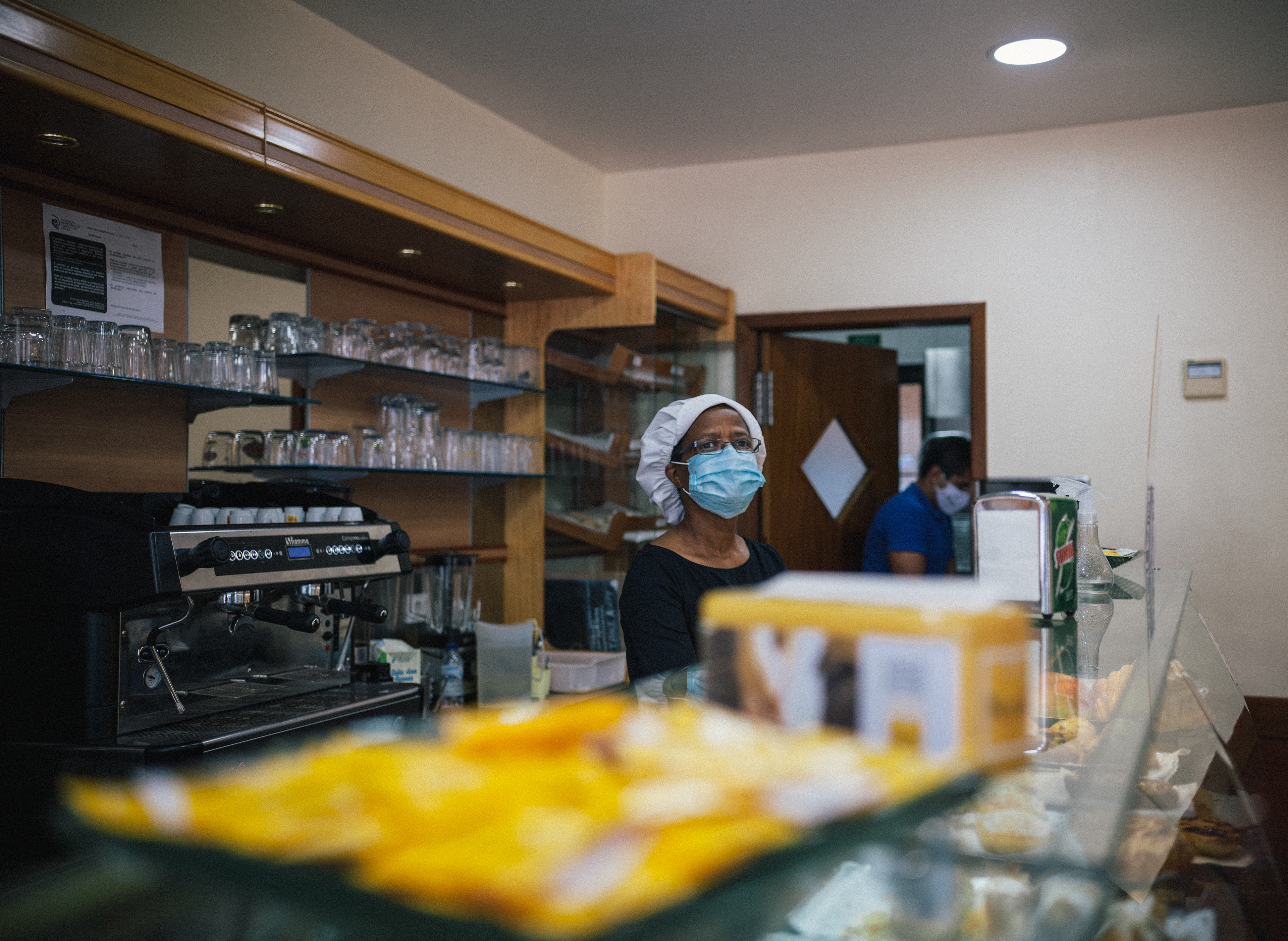
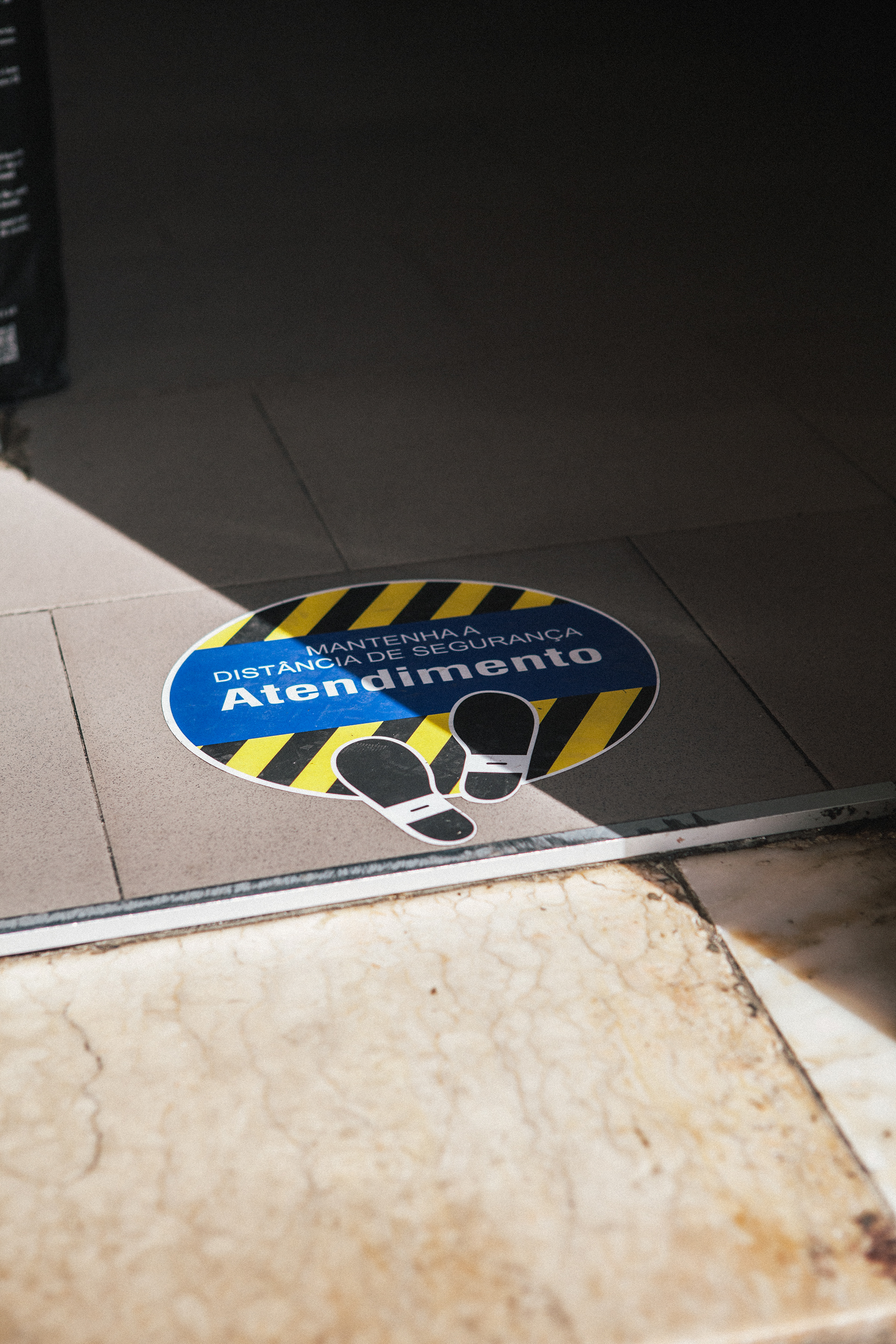
Versão Portuguesa
O seguinte artigo foi escrito poucos dias depois das novas regras, que entraram em vigor no dia 23 de Junho de 2020, terem sido impostas pelo Governo para a zona da Grande Lisboa.
A crise do Coronavírus já mudou radicalmente o mundo como o conhecíamos. A pandemia desencadeou uma catástrofe na saúde a nível global, com consequências drásticas para economia e na nossa maneira de viver.
Em Portugal, a situação tem sido desconcertante. Numa questão de semanas, a nossa aclamada resposta contra o vírus dentro do quadro Europeu desmoronou-se. Os casos têm vindo a subir significativamente, em particular na área da Grande Lisboa, o que levou o Governo a impor novas restrições. Para donos de pequenas empresas, que continuam a tentar operar os seus negócios, estes são tempos extremamente incertos.
Tendo regressado temporariamente para casa dos meus pais, num bairro em Cascais, fiquei com vontade de investigar de forma mais pessoal, os efeitos da pandemia nas nossas vidas. Todos os dias vemos notícias devastadoras sobre o assunto, mas para compreender verdadeiramente as consequências destas novas circunstâncias, decidi que devia falar com aqueles que vivem na minha área local.
Esta curta série fotográfica retrata os pequenos negócios do meu bairro. É a minha tentativa de capturar a nova realidade em que vivemos, o “novo normal”.
(As palavras que se seguem foram adaptadas de conversas, e não alteram o seu significado).
O seguinte artigo foi escrito poucos dias depois das novas regras, que entraram em vigor no dia 23 de Junho de 2020, terem sido impostas pelo Governo para a zona da Grande Lisboa.
A crise do Coronavírus já mudou radicalmente o mundo como o conhecíamos. A pandemia desencadeou uma catástrofe na saúde a nível global, com consequências drásticas para economia e na nossa maneira de viver.
Em Portugal, a situação tem sido desconcertante. Numa questão de semanas, a nossa aclamada resposta contra o vírus dentro do quadro Europeu desmoronou-se. Os casos têm vindo a subir significativamente, em particular na área da Grande Lisboa, o que levou o Governo a impor novas restrições. Para donos de pequenas empresas, que continuam a tentar operar os seus negócios, estes são tempos extremamente incertos.
Tendo regressado temporariamente para casa dos meus pais, num bairro em Cascais, fiquei com vontade de investigar de forma mais pessoal, os efeitos da pandemia nas nossas vidas. Todos os dias vemos notícias devastadoras sobre o assunto, mas para compreender verdadeiramente as consequências destas novas circunstâncias, decidi que devia falar com aqueles que vivem na minha área local.
Esta curta série fotográfica retrata os pequenos negócios do meu bairro. É a minha tentativa de capturar a nova realidade em que vivemos, o “novo normal”.
(As palavras que se seguem foram adaptadas de conversas, e não alteram o seu significado).
PAULA
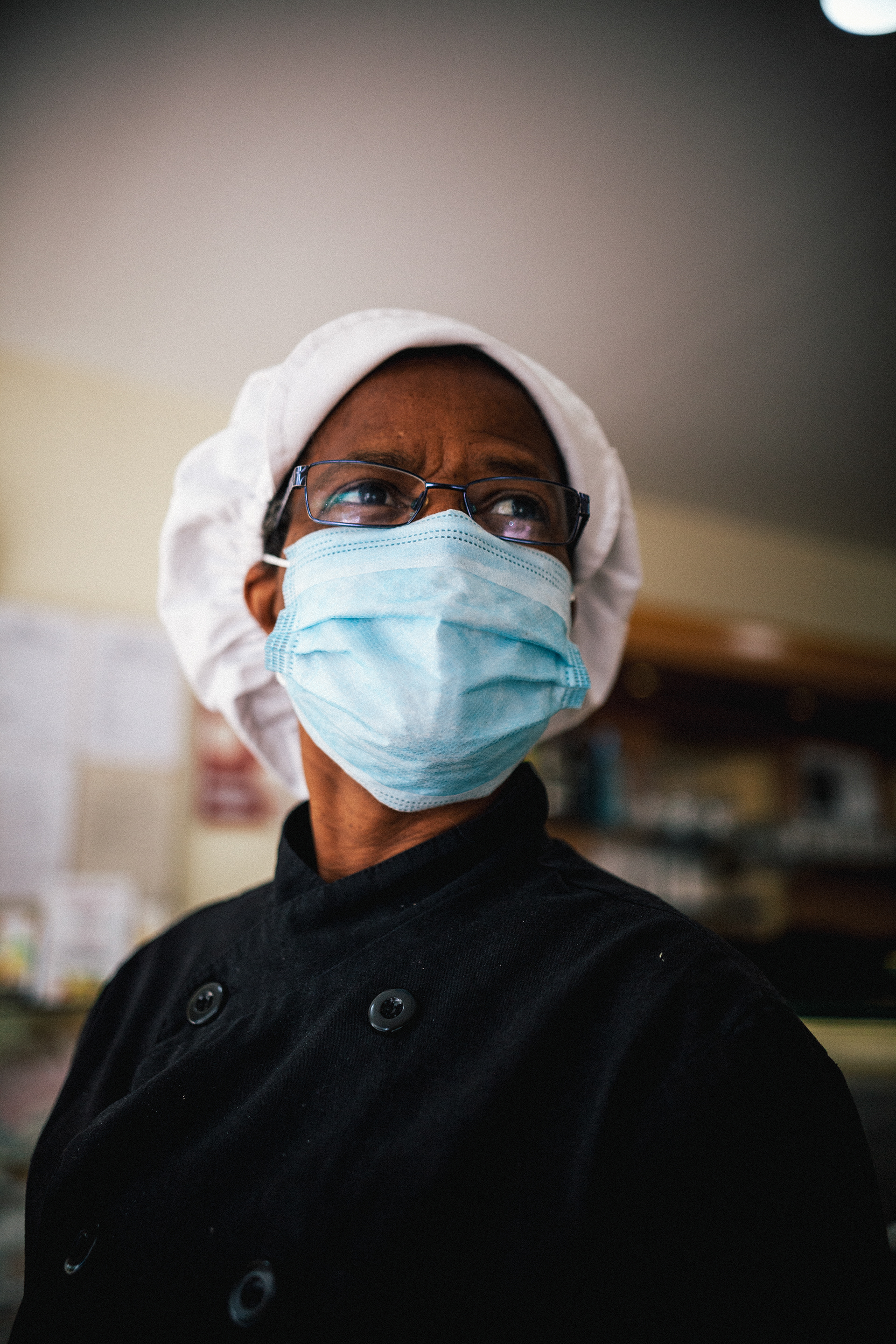
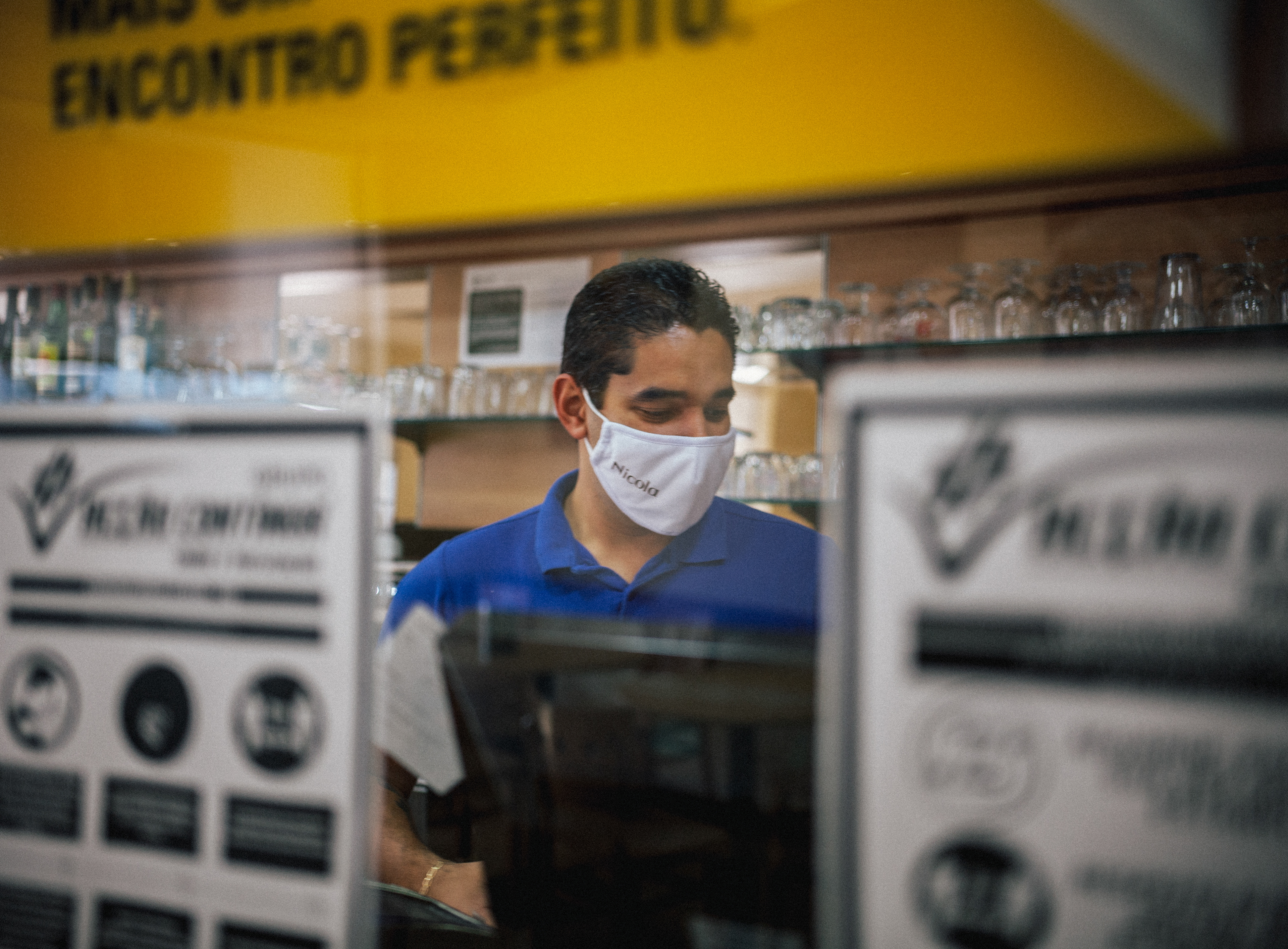
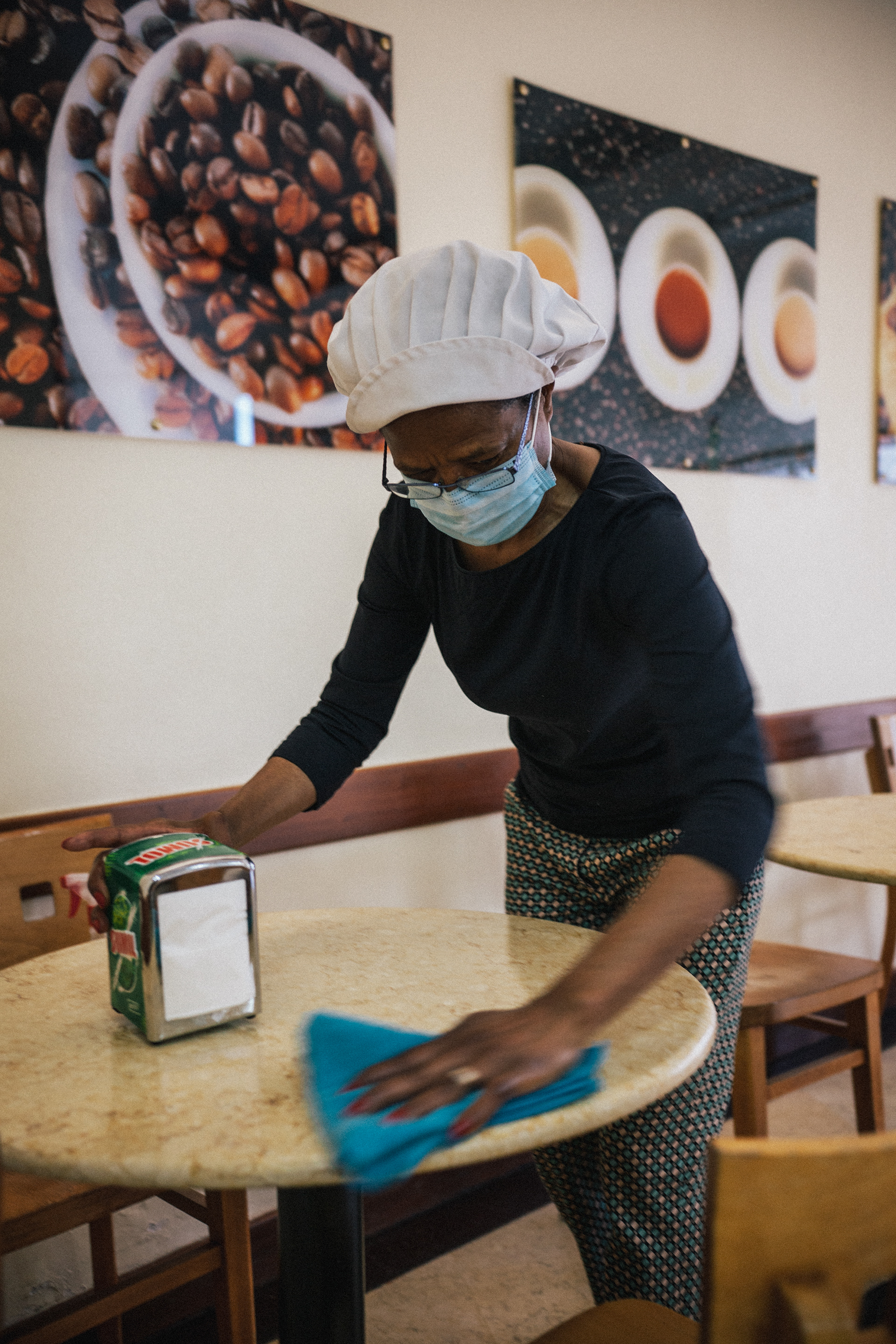
Paula, or Aunt Paula as my sister and I would sometimes call her, is the owner of Dolce & Caffe, the cafe and bakery that opened in our neighborhood 15 years ago. If you are looking for the best home-made meals outside of home, this is the place to go (the soups are divine).
Before this pandemic started, the business was going quite well. “It was a time in which I could finally see the results of my work. To open a cafe had always been a dream of mine, I had always envisioned it as a different sort of cafe. And despite it being small, everything we have here is home-made”, Paula says. But with the arrival of Covid-19, everything came to a halt. At the start of the confinement phase, the cafe was forced to close. Afterward, they were able to open, yet only to sell take-away meals.
“We did it before anyway, but operating 100% as a take-way didn’t work”, Paula tells me. Most clients who dropped by to buy these meals were local workers. Most started working from home while in confinement, so the business stagnated.
Unfortunately, even now that restaurants are allowed to open their doors once again, the cafe’s earnings are still low. “I’m working at 40%. The room is almost always empty, there is a little more movement on the terrace. Most people are still not comfortable enough to go out, they keep on respecting the rules of social distancing, at least in this neighborhood”, says Paula. There are increasing costs and concerns, with the mandatory use of masks and disinfectants, and less support. Being one employee short, busier times become stressful and Paula has ended up having to work more hours to ensure the cafe continues to run smoothly.
“Things are still far from what they used to be. Let’s see if I can hold the fort.”
Before this pandemic started, the business was going quite well. “It was a time in which I could finally see the results of my work. To open a cafe had always been a dream of mine, I had always envisioned it as a different sort of cafe. And despite it being small, everything we have here is home-made”, Paula says. But with the arrival of Covid-19, everything came to a halt. At the start of the confinement phase, the cafe was forced to close. Afterward, they were able to open, yet only to sell take-away meals.
“We did it before anyway, but operating 100% as a take-way didn’t work”, Paula tells me. Most clients who dropped by to buy these meals were local workers. Most started working from home while in confinement, so the business stagnated.
Unfortunately, even now that restaurants are allowed to open their doors once again, the cafe’s earnings are still low. “I’m working at 40%. The room is almost always empty, there is a little more movement on the terrace. Most people are still not comfortable enough to go out, they keep on respecting the rules of social distancing, at least in this neighborhood”, says Paula. There are increasing costs and concerns, with the mandatory use of masks and disinfectants, and less support. Being one employee short, busier times become stressful and Paula has ended up having to work more hours to ensure the cafe continues to run smoothly.
“Things are still far from what they used to be. Let’s see if I can hold the fort.”
A Paula, ou tia Paula como eu e a minha irmã por vezes a chamamos, é a dona do Dolce Caffe, um café e pastelaria que abriu há 15 anos no nosso bairro. Se procuram as melhores refeições caseiras fora de casa, este é o sítio ideal (as sopa então são divinais).
Antes da pandemia começar, o negócio estava a correr muito bem. “Foi uma altura em que eu estava finalmente a ver o resultado do meu trabalho. Este café foi sempre um sonho meu, sempre quis que fosse diferente dos outros. E apesar desta casa não ser grande, tudo o que aqui temos é feito por nós”, diz a Paula. Mas com a vinda da Covid-19, tudo parou. No início da fase de confinamento tiveram de encerrar o café. Só depois começaram a abrir, primeiramente apenas para refeições take-away.
“Já o fazíamos anteriormente, mas depois passámos a funcionar 100% com o take-away, o que não resultou tão bem”, conta-me a Paula. A maior parte dos clientes que vinham buscar refeições eram pessoas que trabalhavam no bairro. Sendo que na altura todos ficaram a trabalhar a partir de casa, o café estagnou.
Infelizmente, mesmo agora que os negócios de restauração já puderam abrir as suas portas, o rendimento continua a ser pouco. “Estou basicamente a trabalhar a 40%. A sala está quase sempre vazia, o que tem mais movimento é a esplanada. As pessoas ainda não se sentem muito à vontade e continuam a cumprir o distanciamento social, pelo menos aqui no bairro”, diz a Paula. São mais os custos e as preocupações, com o acréscimo da obrigatoriedade das máscaras e desinfectantes, e menos ajudas. Com menos um empregado, existem por vezes alturas de mais stress, e a Paula acaba também por ter de trabalhar mais horas de maneira a garantir que o café continue funcional.
“As coisas ainda continuam muito aquém do que eram. Vamos ver se me consigo aguentar."
Antes da pandemia começar, o negócio estava a correr muito bem. “Foi uma altura em que eu estava finalmente a ver o resultado do meu trabalho. Este café foi sempre um sonho meu, sempre quis que fosse diferente dos outros. E apesar desta casa não ser grande, tudo o que aqui temos é feito por nós”, diz a Paula. Mas com a vinda da Covid-19, tudo parou. No início da fase de confinamento tiveram de encerrar o café. Só depois começaram a abrir, primeiramente apenas para refeições take-away.
“Já o fazíamos anteriormente, mas depois passámos a funcionar 100% com o take-away, o que não resultou tão bem”, conta-me a Paula. A maior parte dos clientes que vinham buscar refeições eram pessoas que trabalhavam no bairro. Sendo que na altura todos ficaram a trabalhar a partir de casa, o café estagnou.
Infelizmente, mesmo agora que os negócios de restauração já puderam abrir as suas portas, o rendimento continua a ser pouco. “Estou basicamente a trabalhar a 40%. A sala está quase sempre vazia, o que tem mais movimento é a esplanada. As pessoas ainda não se sentem muito à vontade e continuam a cumprir o distanciamento social, pelo menos aqui no bairro”, diz a Paula. São mais os custos e as preocupações, com o acréscimo da obrigatoriedade das máscaras e desinfectantes, e menos ajudas. Com menos um empregado, existem por vezes alturas de mais stress, e a Paula acaba também por ter de trabalhar mais horas de maneira a garantir que o café continue funcional.
“As coisas ainda continuam muito aquém do que eram. Vamos ver se me consigo aguentar."
LUÍS
Luís opened his butcher shop "Pampitalho" in our neighborhood about 10 years ago. I still remember this, as my sister kept hassling our mother to go check out the new "little market", as she called it, which had opened around the corner.
Luís wasn't from around here so he slowly built the trust of the locals and soon grew a strong customer base. In fact, it looks like the shop is still quite busy, as during our conversation I continuously let myself out so that a new customer, waiting by the door, could come in instead.
When it comes to his business, the pandemic hasn't negatively affected him, it seems. "People are actually buying more now so they can keep a stock at home", he explains as he slices a piece of meat. Even though regular customers don't go as often to the shop, they are still ordering via phone. This gives Luís and his colleague Cristian the time to arrange the packages, which are ready to go once the client arrives. "It all works slightly differently now. Customers come less often, but they do buy added quantities. A lot of people are working from home, they have their kids at home, so they end up consuming more. Which for my business is good news, I've been selling up to 3 times more than before", Luís adds.
O Luís abriu o “Pampitalho”, o talho e mercearia do nosso bairro, há 10 anos. Ainda me lembro disto porque na altura a minha irmã pedia incessantemente à minha mãe que lá fossem espreitar o novo “minimercado”, como ela dizia, que tinha aberto ao fundo da rua.
Não sendo local, o Luís foi ganhando a confiança das pessoas e rapidamente arranjou um bom número de clientes. E de facto, parece que o talho continua movimentado - durante a nossa conversa eu vou entrando e saindo para dar lugar a clientes que vão aparecendo à porta.
Em relação ao seu negócio, a pandemia não o parece ter afetado de forma negativa. “As pessoas até estão a comprar mais agora, de maneira a terem um stock em casa”, explica-me enquanto corta uma peça de carne. Mesmo com menos visitas à mercearia, os clientes continuam a fazer pedidos através do telefone. Isto faz com que o Luís e o seu colega Cristian tenham mais tempo para preparar cada encomenda, que estará pronta quando o cliente a vem buscar. “Tudo funciona de uma maneira um bocadinho diferente. O cliente vem menos vezes, mas compra muito mais. Como as pessoas estão a trabalhar de casa, têm os filhos em casa, acabam por consumir mais. O que para o meu negócio é muito bom, nesta altura tenho vendido até 3 vezes mais”, conta-me o Luís.
Luís wasn't from around here so he slowly built the trust of the locals and soon grew a strong customer base. In fact, it looks like the shop is still quite busy, as during our conversation I continuously let myself out so that a new customer, waiting by the door, could come in instead.
When it comes to his business, the pandemic hasn't negatively affected him, it seems. "People are actually buying more now so they can keep a stock at home", he explains as he slices a piece of meat. Even though regular customers don't go as often to the shop, they are still ordering via phone. This gives Luís and his colleague Cristian the time to arrange the packages, which are ready to go once the client arrives. "It all works slightly differently now. Customers come less often, but they do buy added quantities. A lot of people are working from home, they have their kids at home, so they end up consuming more. Which for my business is good news, I've been selling up to 3 times more than before", Luís adds.
O Luís abriu o “Pampitalho”, o talho e mercearia do nosso bairro, há 10 anos. Ainda me lembro disto porque na altura a minha irmã pedia incessantemente à minha mãe que lá fossem espreitar o novo “minimercado”, como ela dizia, que tinha aberto ao fundo da rua.
Não sendo local, o Luís foi ganhando a confiança das pessoas e rapidamente arranjou um bom número de clientes. E de facto, parece que o talho continua movimentado - durante a nossa conversa eu vou entrando e saindo para dar lugar a clientes que vão aparecendo à porta.
Em relação ao seu negócio, a pandemia não o parece ter afetado de forma negativa. “As pessoas até estão a comprar mais agora, de maneira a terem um stock em casa”, explica-me enquanto corta uma peça de carne. Mesmo com menos visitas à mercearia, os clientes continuam a fazer pedidos através do telefone. Isto faz com que o Luís e o seu colega Cristian tenham mais tempo para preparar cada encomenda, que estará pronta quando o cliente a vem buscar. “Tudo funciona de uma maneira um bocadinho diferente. O cliente vem menos vezes, mas compra muito mais. Como as pessoas estão a trabalhar de casa, têm os filhos em casa, acabam por consumir mais. O que para o meu negócio é muito bom, nesta altura tenho vendido até 3 vezes mais”, conta-me o Luís.
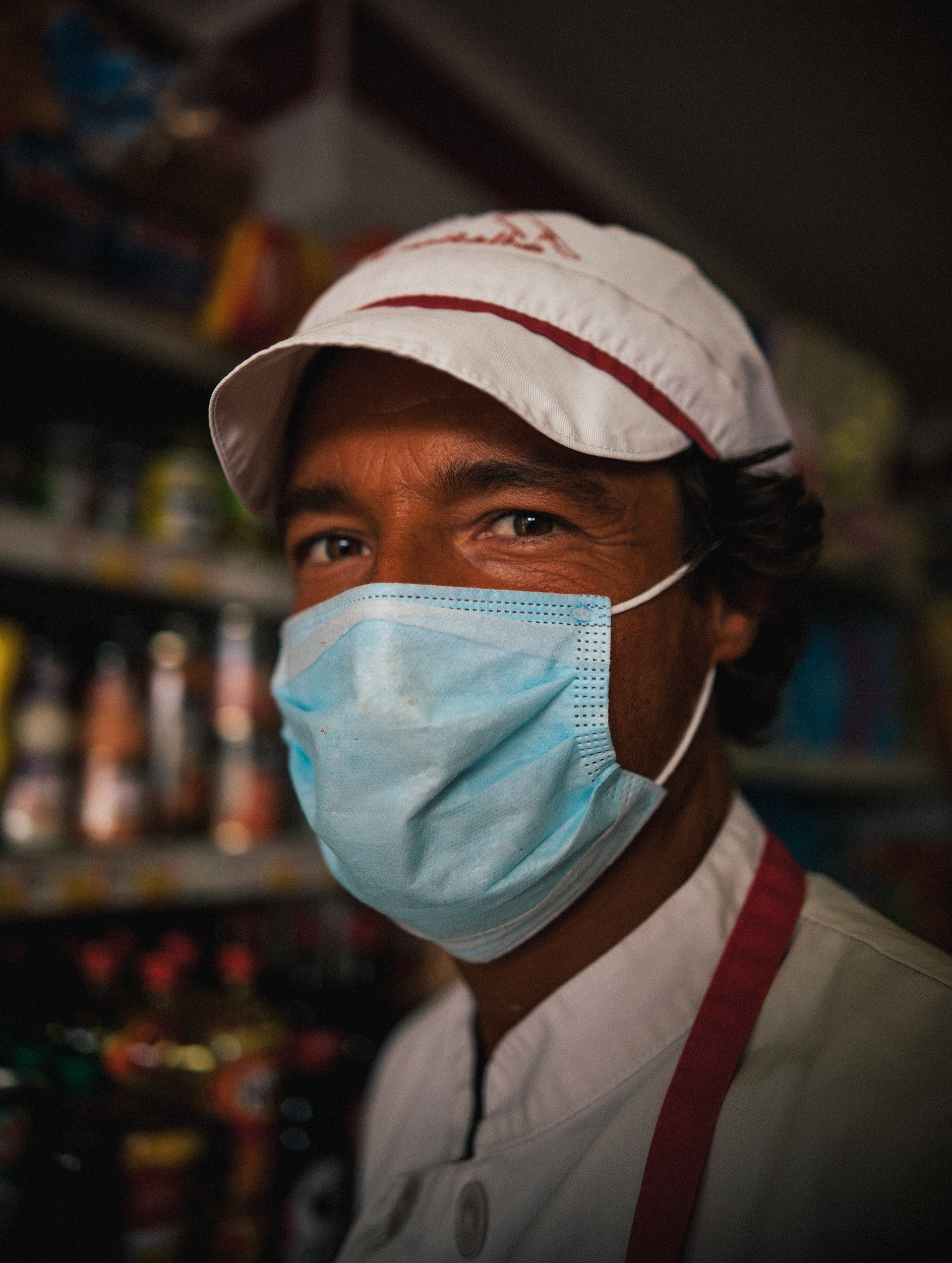
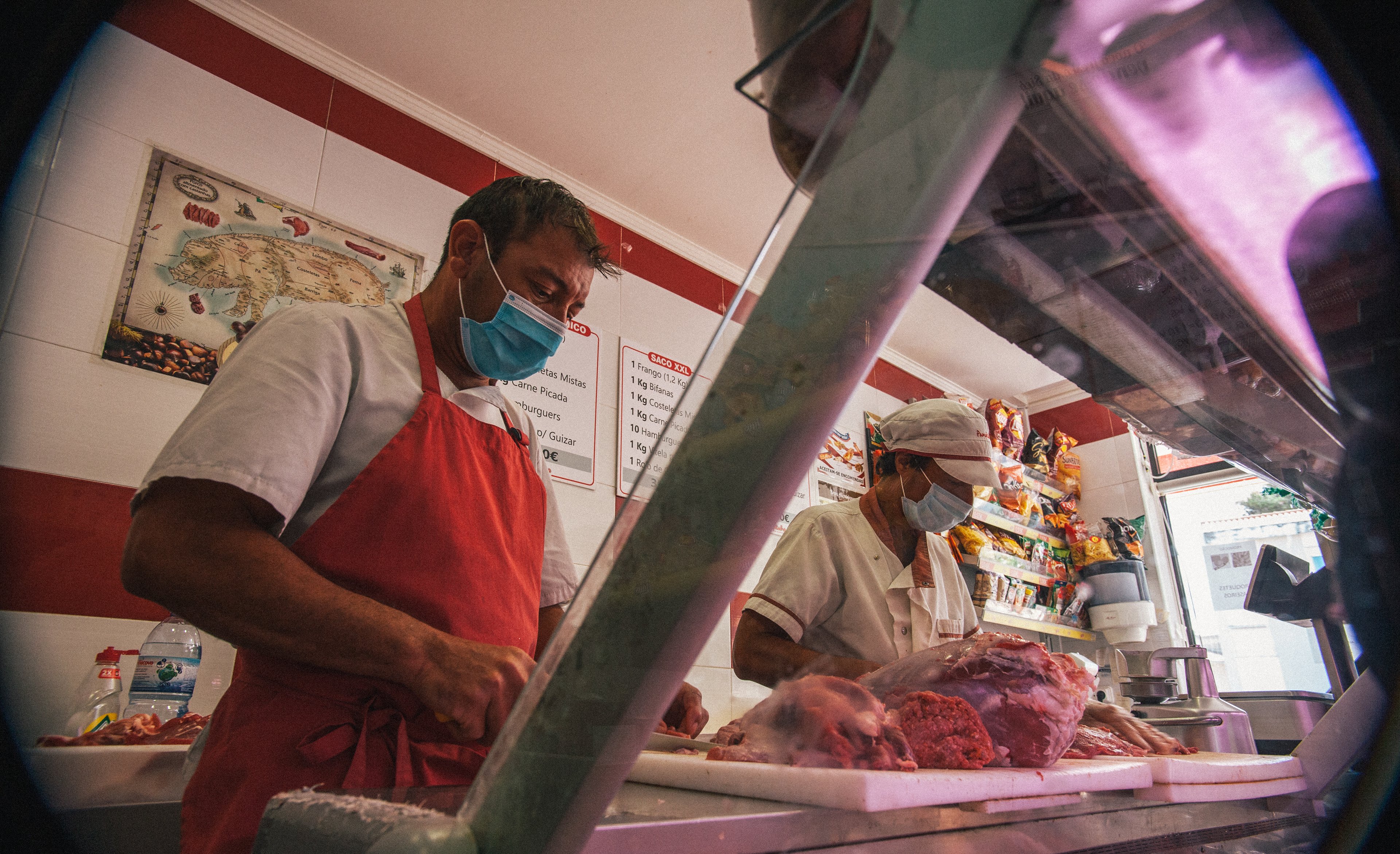
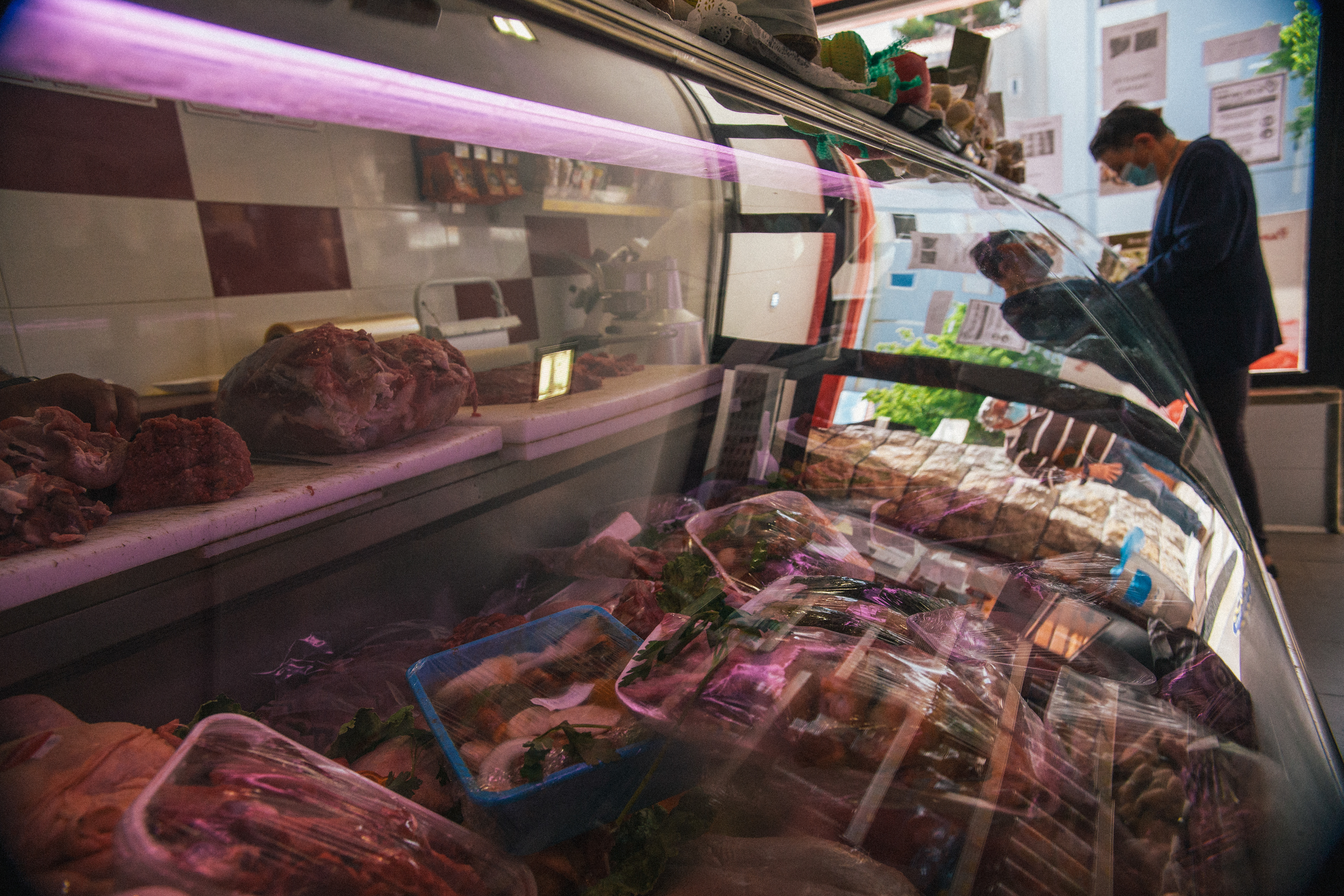
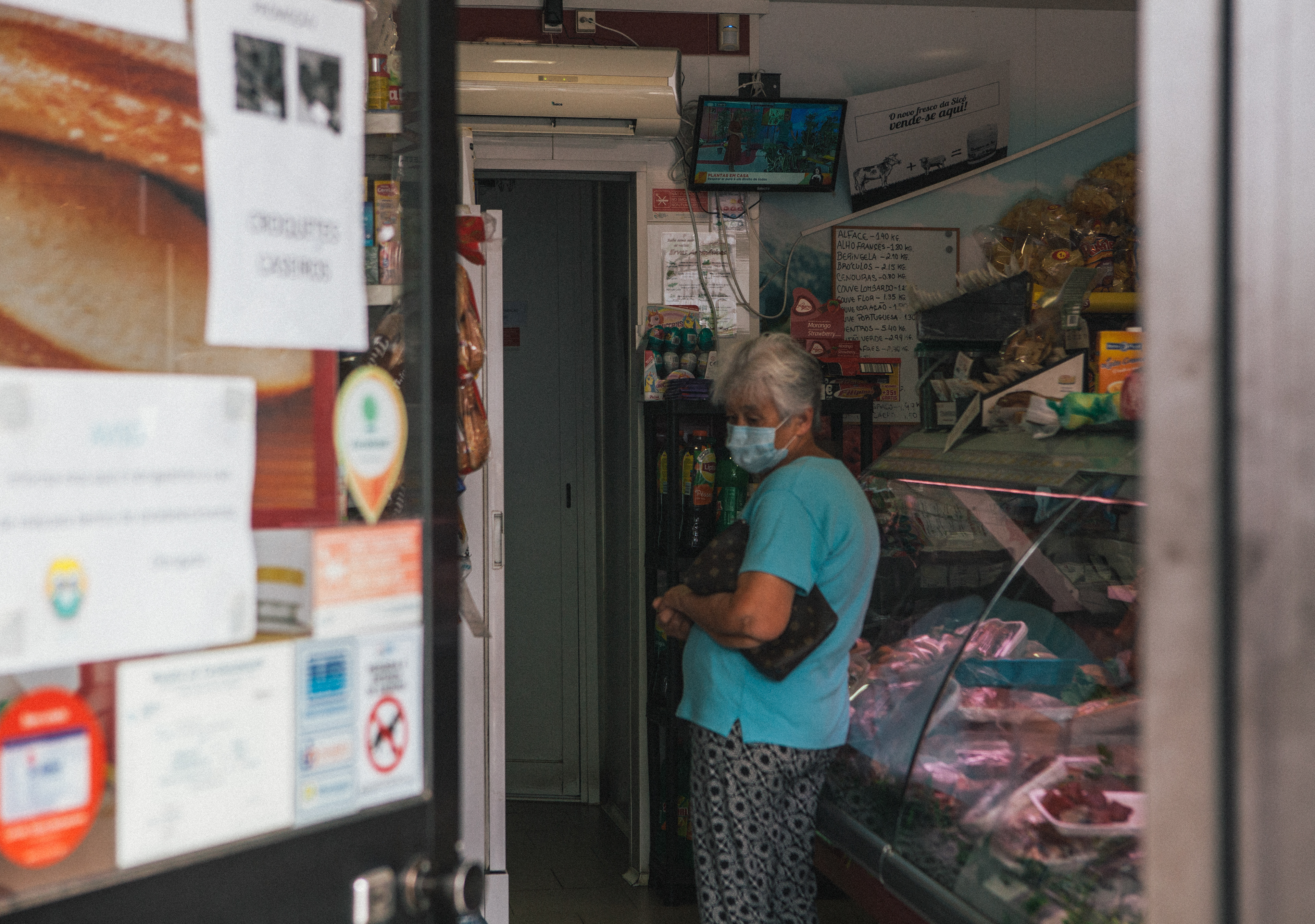
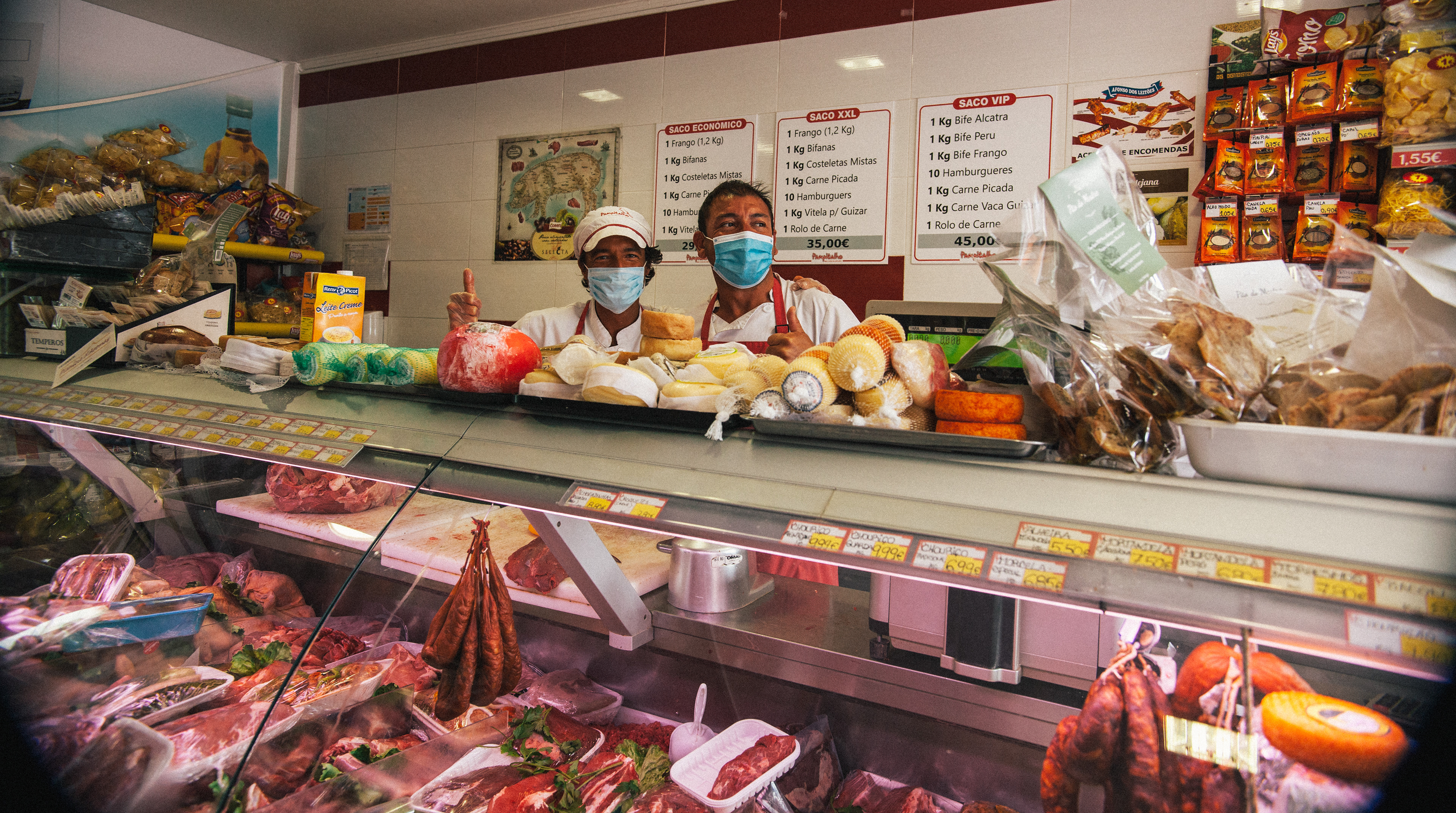
António
António acquired "Apolo", my neighborhood's newsagent shop, nearly 1 year ago. "I was tired of my previous job and this opportunity came up so I decided to invest in it".
Things have not been easy. António says that the pandemic decreased people's willingness to gamble in the lottery, which was one of his shop's largest sources of income. "As people were staying home, and all sports games were canceled, there was a significant break in the shop's earnings", he explains. He tells me that even now, with some restrictions lifted, people are still buying less. "Everyone was affected, many workers were furloughed, so people are thinking a lot more about what they can spend. People need to save up in case a situation like this happens again."
“Bom dia", we are greeted by an older man in a mask, as we chat outside, so António excuses himself shortly to assist him. Suddenly, more customers show up, forming a line before the shop's doors. I walk around for a while and return when António is free again.
He comes back outside and carries on, explaining that selling newspapers and lottery cards meant his shop had permission to stay open throughout confinement, which is an advantage. "By selling newspapers, we keep people informed about what's happening, which is one of the reasons we are allowed to stay open."
O António adquiriu a “Apolo”, a tabacaria e papelaria do bairro, há quase 1 ano. “Estava cansado do meu trabalho e quando surgiu esta oportunidade decidi investir.”
Não tem sido fácil. O António conta que a pandemia diminuiu a vontade das pessoas apostarem no jogo, que era a maior fonte de rendimento da loja. “Como as pessoas estavam em casa, e todos os eventos desportivos foram cancelados, houve uma grande quebra nos lucros da loja”, explica. Diz-me que, mesmo agora que algumas restrições foram levantadas depois do confinamento, as pessoas continuam a comprar menos. “Todos fomos afetados por isto, muitos trabalhadores foram postos em layoff, por isso a tendência é pensar muito mais sobre o que se pode gastar. As pessoas necessitam de poupar para o caso de uma situação como esta voltar a acontecer.”
“Bom dia", enquanto estamos a conversar cá fora somos cumprimentados por um senhor mais velho de máscara, por isso o António desculpa-se para o ir ajudar dentro da loja. E de repente outros clientes aparecem, começando a formar uma fila à porta. Decido ir dar uma volta e regresso quando vejo que o António ficou livre novamente.
Ele volta cá para fora e retoma a nossa conversa, explicando-me que através da venda de jornais e do jogo, a sua loja tinha licença para continuar aberta durante o confinamento, o que é certamente uma vantagem. “Como vendemos jornais mantemos as pessoas informadas sobre o que se está a passar, o que é uma das razões pelas quais podemos continuar sempre abertos.”
Things have not been easy. António says that the pandemic decreased people's willingness to gamble in the lottery, which was one of his shop's largest sources of income. "As people were staying home, and all sports games were canceled, there was a significant break in the shop's earnings", he explains. He tells me that even now, with some restrictions lifted, people are still buying less. "Everyone was affected, many workers were furloughed, so people are thinking a lot more about what they can spend. People need to save up in case a situation like this happens again."
“Bom dia", we are greeted by an older man in a mask, as we chat outside, so António excuses himself shortly to assist him. Suddenly, more customers show up, forming a line before the shop's doors. I walk around for a while and return when António is free again.
He comes back outside and carries on, explaining that selling newspapers and lottery cards meant his shop had permission to stay open throughout confinement, which is an advantage. "By selling newspapers, we keep people informed about what's happening, which is one of the reasons we are allowed to stay open."
O António adquiriu a “Apolo”, a tabacaria e papelaria do bairro, há quase 1 ano. “Estava cansado do meu trabalho e quando surgiu esta oportunidade decidi investir.”
Não tem sido fácil. O António conta que a pandemia diminuiu a vontade das pessoas apostarem no jogo, que era a maior fonte de rendimento da loja. “Como as pessoas estavam em casa, e todos os eventos desportivos foram cancelados, houve uma grande quebra nos lucros da loja”, explica. Diz-me que, mesmo agora que algumas restrições foram levantadas depois do confinamento, as pessoas continuam a comprar menos. “Todos fomos afetados por isto, muitos trabalhadores foram postos em layoff, por isso a tendência é pensar muito mais sobre o que se pode gastar. As pessoas necessitam de poupar para o caso de uma situação como esta voltar a acontecer.”
“Bom dia", enquanto estamos a conversar cá fora somos cumprimentados por um senhor mais velho de máscara, por isso o António desculpa-se para o ir ajudar dentro da loja. E de repente outros clientes aparecem, começando a formar uma fila à porta. Decido ir dar uma volta e regresso quando vejo que o António ficou livre novamente.
Ele volta cá para fora e retoma a nossa conversa, explicando-me que através da venda de jornais e do jogo, a sua loja tinha licença para continuar aberta durante o confinamento, o que é certamente uma vantagem. “Como vendemos jornais mantemos as pessoas informadas sobre o que se está a passar, o que é uma das razões pelas quais podemos continuar sempre abertos.”
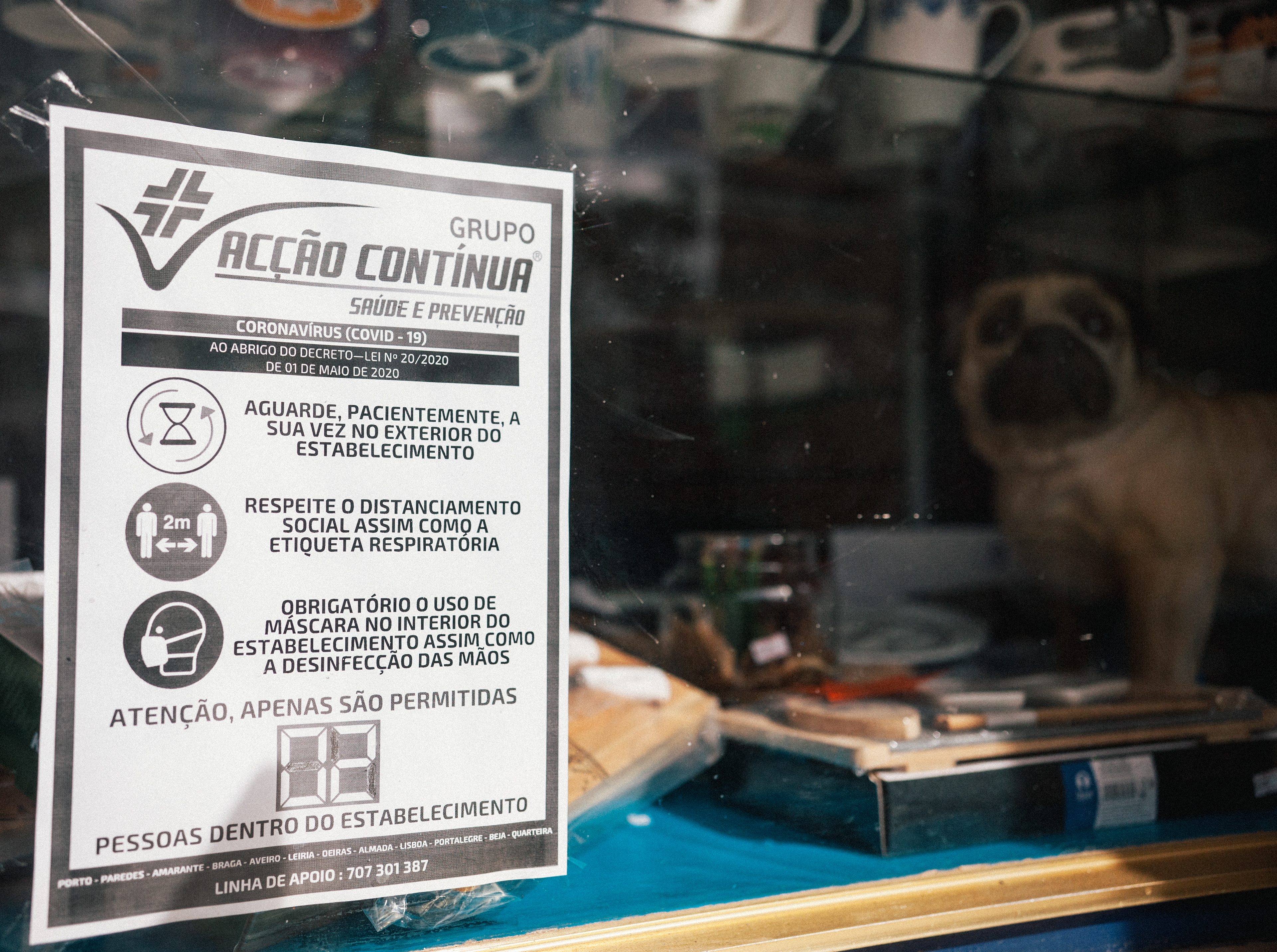
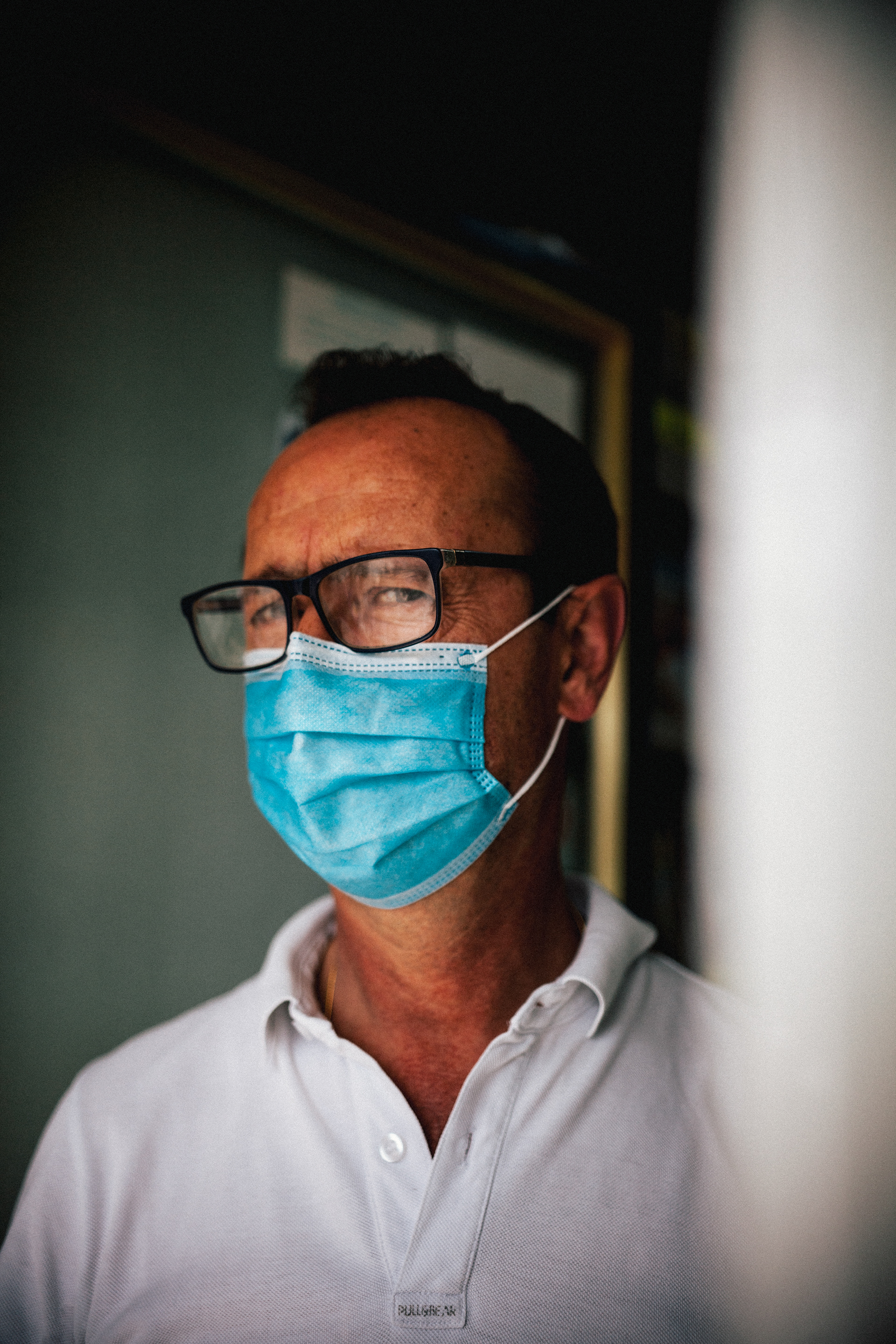
Fátima
Fátima is the owner and chef of our neighborhood's restaurant, "A Roda", which opened back in 1995. My family, cousins and grandfather included, are absolute fans of their mouthwatering arroz de tamboril (monkfish rice stew).
Fátima tells me that, ever since the confinement, they've been working 50% less. Gladly, even when the state of emergency was announced, they were able to work by doing take-way meals. "It wasn't the same, but it surpassed my expectations", says Fátima. But even now that restaurants are allowed to host again, business is still quite irregular. "I don't believe customers aren't coming in because they are afraid, it's the shortage of money. In that sense, and especially with the take-way meals, I've tried to make dishes where a portion is big enough for two. Usually, these cost about 8 euros. This is not the time to increase prices", she explains.
Despite the challenges, Fátima is staying positive. "In a way, it's been nice to finish work early, I've had time to slow down, read...", she runs over to the kitchen to turn down the heat on a pot. "I never had time off before, there were days when we would finish work at midnight. These times have been hard, but we've been able to survive, we've learned to run things differently." This "slowing down" also applies to the customers, who seem to have become more patient when waiting outside for the take-away meals.
Recently, with new restrictions imposed, restaurants have to close their doors at 8 pm. "It's a step backward again, now we have to stop service on the terrace earlier. But it is what it is. We have to think one day at a time."
A Fátima é a dona e chef do restaurante “A Roda”, que abriu no bairro em 1995. Na minha família somos todos fãs do seu maravilhoso arroz de tamboril.
A Fátima conta-me que, desde o confinamento, têm trabalhado basicamente a 50 por cento. Felizmente, mesmo quando o estado de emergência foi anunciado, eles puderam continuar a trabalhar vendendo refeições para fora. “Não foi a mesma coisa, mas até superou as minhas expectativas”, diz a Fátima. Mas mesmo agora que os restaurantes já têm autorização para receber clientes, o negócio continua muito irregular. “Não acredito que as pessoas não estejam a vir por medo, é a falta de dinheiro. Nesse sentido, e em especial nas refeições para take-away, eu tentei fazer pratos onde uma porção é suficiente para dois. Normalmente estas custam à volta dos 8 euros. Não estamos em altura de começar a subir preços”, explica.
Apesar das dificuldades, a Fátima continua positiva. “De certa forma até tem sido agradável acabar o trabalho mais cedo, tenho tido tempo para acalmar, ler…”, corre rapidamente até à cozinha para baixar o lume numa das panelas. “Eu nunca tinha tempo livre, eram muitos os dias em que acabávamos de trabalhar à meia noite. Estes tempos têm sido difíceis, mas temos conseguido sobreviver e estamos a aprender a fazer tudo de uma maneira diferente.” Até os clientes mudaram o seu comportamento, são agora muito mais pacientes quando esperam lá fora pelas encomendas.
Com as novas restrições impostas, os restaurantes têm de fechar as suas portas mais cedo de novo, às 8 da noite. “É dar uma passo atrás, agora somos obrigados a fechar o serviço na esplanada mais cedo. Mas é assim, temos de pensar um dia de cada vez.”
Fátima tells me that, ever since the confinement, they've been working 50% less. Gladly, even when the state of emergency was announced, they were able to work by doing take-way meals. "It wasn't the same, but it surpassed my expectations", says Fátima. But even now that restaurants are allowed to host again, business is still quite irregular. "I don't believe customers aren't coming in because they are afraid, it's the shortage of money. In that sense, and especially with the take-way meals, I've tried to make dishes where a portion is big enough for two. Usually, these cost about 8 euros. This is not the time to increase prices", she explains.
Despite the challenges, Fátima is staying positive. "In a way, it's been nice to finish work early, I've had time to slow down, read...", she runs over to the kitchen to turn down the heat on a pot. "I never had time off before, there were days when we would finish work at midnight. These times have been hard, but we've been able to survive, we've learned to run things differently." This "slowing down" also applies to the customers, who seem to have become more patient when waiting outside for the take-away meals.
Recently, with new restrictions imposed, restaurants have to close their doors at 8 pm. "It's a step backward again, now we have to stop service on the terrace earlier. But it is what it is. We have to think one day at a time."
A Fátima é a dona e chef do restaurante “A Roda”, que abriu no bairro em 1995. Na minha família somos todos fãs do seu maravilhoso arroz de tamboril.
A Fátima conta-me que, desde o confinamento, têm trabalhado basicamente a 50 por cento. Felizmente, mesmo quando o estado de emergência foi anunciado, eles puderam continuar a trabalhar vendendo refeições para fora. “Não foi a mesma coisa, mas até superou as minhas expectativas”, diz a Fátima. Mas mesmo agora que os restaurantes já têm autorização para receber clientes, o negócio continua muito irregular. “Não acredito que as pessoas não estejam a vir por medo, é a falta de dinheiro. Nesse sentido, e em especial nas refeições para take-away, eu tentei fazer pratos onde uma porção é suficiente para dois. Normalmente estas custam à volta dos 8 euros. Não estamos em altura de começar a subir preços”, explica.
Apesar das dificuldades, a Fátima continua positiva. “De certa forma até tem sido agradável acabar o trabalho mais cedo, tenho tido tempo para acalmar, ler…”, corre rapidamente até à cozinha para baixar o lume numa das panelas. “Eu nunca tinha tempo livre, eram muitos os dias em que acabávamos de trabalhar à meia noite. Estes tempos têm sido difíceis, mas temos conseguido sobreviver e estamos a aprender a fazer tudo de uma maneira diferente.” Até os clientes mudaram o seu comportamento, são agora muito mais pacientes quando esperam lá fora pelas encomendas.
Com as novas restrições impostas, os restaurantes têm de fechar as suas portas mais cedo de novo, às 8 da noite. “É dar uma passo atrás, agora somos obrigados a fechar o serviço na esplanada mais cedo. Mas é assim, temos de pensar um dia de cada vez.”
